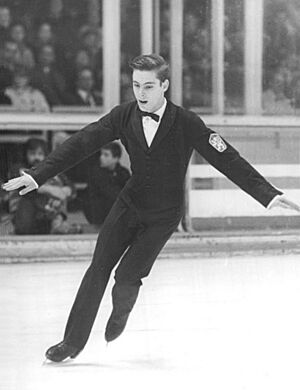Ondrej Nepela facts for kids
Quick facts for kids Ondrej Nepela |
|||||||||||||||||||||||||||||||||||||||||||||||||||||||||||
|---|---|---|---|---|---|---|---|---|---|---|---|---|---|---|---|---|---|---|---|---|---|---|---|---|---|---|---|---|---|---|---|---|---|---|---|---|---|---|---|---|---|---|---|---|---|---|---|---|---|---|---|---|---|---|---|---|---|---|---|

Nepela in 1972
|
|||||||||||||||||||||||||||||||||||||||||||||||||||||||||||
| Personal information | |||||||||||||||||||||||||||||||||||||||||||||||||||||||||||
| Country represented | |||||||||||||||||||||||||||||||||||||||||||||||||||||||||||
| Born | 22 January 1951 Bratislava, Czechoslovakia |
||||||||||||||||||||||||||||||||||||||||||||||||||||||||||
| Died | 2 February 1989 (aged 38) Mannheim, West Germany |
||||||||||||||||||||||||||||||||||||||||||||||||||||||||||
| Former coach | Hilda Múdra | ||||||||||||||||||||||||||||||||||||||||||||||||||||||||||
| Skating club | Slovan Bratislava | ||||||||||||||||||||||||||||||||||||||||||||||||||||||||||
| Began skating | 1958 | ||||||||||||||||||||||||||||||||||||||||||||||||||||||||||
| Retired | 1973 | ||||||||||||||||||||||||||||||||||||||||||||||||||||||||||
|
Medal record
|
|||||||||||||||||||||||||||||||||||||||||||||||||||||||||||
Ondrej Nepela (born January 22, 1951 – died February 2, 1989) was a famous Slovak figure skater. He represented Czechoslovakia in competitions. He won many big titles during his career.
Ondrej was the 1972 Olympic champion. He also won the World Championships three times (from 1971 to 1973). Plus, he was a European champion five times in a row (from 1969 to 1973). After he stopped competing, he became a professional skater and a coach.
Contents
Early Life and Start in Skating
Ondrej Nepela was born in Bratislava, Czechoslovakia, on January 22, 1951. His parents were from central Slovakia. His mother was a homemaker and a seamstress, and his father was a driver.
Ondrej became interested in skating when he was young. He watched the 1958 European Championships on TV. A skater from Czechoslovakia, Karol Divín, won the men's title, which inspired Ondrej.
In February 1958, when he was seven years old, his mother took him to an ice rink in Bratislava. After two weeks, she asked Hilda Múdra to teach him. Hilda Múdra became his coach and said he was a very hard-working student. Ondrej trained at the Slovan Bratislava club.
Amazing Competitive Career
When Ondrej was just 13, he competed in his first big international event. This was the 1964 Winter Olympics in Innsbruck, Austria. He placed 22nd there. Soon after, he competed in the World Championships and finished 17th.
First Medals and Wins
In the 1965–66 skating season, Ondrej won his first medal at a major competition. He earned a bronze medal at the 1966 European Championships in Bratislava. He then placed in the top ten at the 1966 World Championships in Davos, Switzerland.
Over the next two seasons, he won two more European bronze medals. He also placed eighth at his second Olympics, held in Grenoble, France.
Becoming a Champion
The 1968–69 season was a big one for Ondrej. He won his first gold medal at the 1969 European Championships in Garmisch-Partenkirchen, West Germany. He also won his first World medal, a silver, at the 1969 World Championships in Colorado Springs, USA.
The next year, he won his European title again at the 1970 European Championships in Leningrad, Soviet Union. He then earned another silver medal at the 1970 World Championships in Ljubljana, Yugoslavia.
In 1971, Ondrej won his third European title in Zürich, Switzerland. Then, he won his first World title at the 1971 World Championships in Lyon, France.
Olympic Gold and Retirement
After winning his fourth European title in a row in Gothenburg, Sweden, Ondrej went to Sapporo, Japan. He was there to compete in his third Olympics.
At the 1972 Winter Olympics, he performed wonderfully. He won the gold medal, becoming one of the youngest male Olympic champions in figure skating.
Ondrej wanted to stop competing after the 1971–72 season. However, he agreed to skate for one more year. This was because the 1973 World Championships were going to be held in his hometown, Bratislava. After winning his third World title there, he ended his amateur skating career. His coach, Hilda Múdra, was with him throughout his entire competitive journey.
Professional Career and Legacy
After his amateur career, Ondrej Nepela became a professional skater. From 1973 to 1986, he toured as a solo performer with a show called Holiday on Ice.
Later, he became a coach in Germany. He coached Claudia Leistner, who won a European title in 1989.
In 1972, Ondrej was given the special title of Merited Master of Sport of the USSR. To honor him, the Slovak Figure Skating Association has held a competition called the Ondrej Nepela Memorial every autumn since 1993. In December 2000, the Slovak Republic named him the Slovak athlete of the 20th century. His coach, Hilda Múdra, accepted the award for him.
Later Years
Ondrej Nepela passed away in February 1989 in Mannheim, Germany, at the age of 38.
Results
| International Competitions | ||||||||||
|---|---|---|---|---|---|---|---|---|---|---|
| Event | 63–64 | 64–65 | 65–66 | 66–67 | 67–68 | 68–69 | 69–70 | 70–71 | 71–72 | 72–73 |
| Winter Olympics | 22nd | 8th | 1st | |||||||
| World Championships | 17th | 16th | 8th | 6th | 6th | 2nd | 2nd | 1st | 1st | 1st |
| European Champ. | 8th | 3rd | 3rd | 3rd | 1st | 1st | 1st | 1st | 1st | |
| Prize of Moscow News | 1st | |||||||||
| Prague Skate | 1st | 2nd | 1st | 1st | ||||||
| National Competitions | ||||||||||
| Czechoslovak Champ. | 1st | 1st | 1st | 1st | 1st | 1st | 1st | 1st | ||
Images for kids


